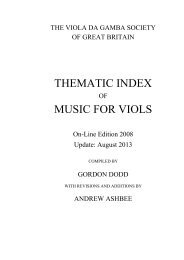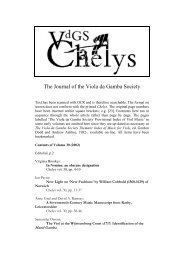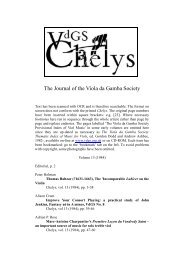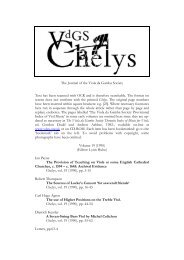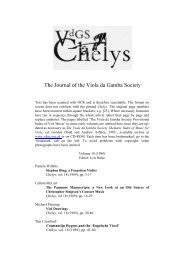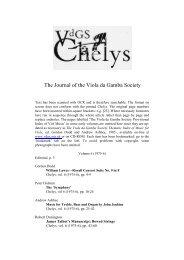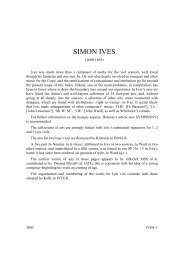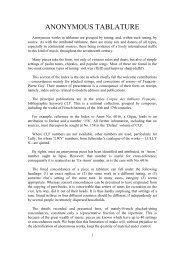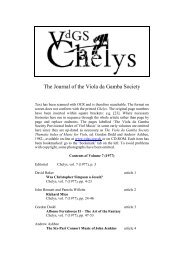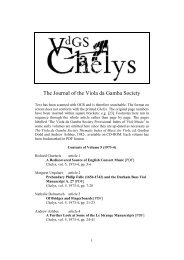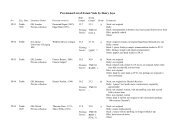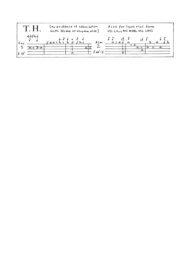download.pdf - 1.2Mb - Viola da Gamba Society
download.pdf - 1.2Mb - Viola da Gamba Society
download.pdf - 1.2Mb - Viola da Gamba Society
You also want an ePaper? Increase the reach of your titles
YUMPU automatically turns print PDFs into web optimized ePapers that Google loves.
<strong>da</strong> gamba, that remnant of the old chest of viols ... It has been justly<br />
observed in an account of Abel, well drawn up, and inserted in the<br />
Morning Post, June 22d, 1787, soon after his funeral, that 'his favourite<br />
instrument was not in general use, and would probably die with him'. It<br />
was practised longer in Germany than elsewhere; but since the death of<br />
the late Elector of Bavaria, who next to Abel was the best performer on<br />
the viol <strong>da</strong> gamba I had ever heard, the instrument seems laid aside. 56<br />
That this was clearly not the case, even in England, is attested to by the fact<br />
that Dahmen continued to perform publicly on the viola <strong>da</strong> gamba in London<br />
until at least 1800.<br />
Whether Burney was actually reflecting on his own personal experiences<br />
when writing his account, expecting (or hoping!) never to hear a gamba played<br />
again, or simply venting his spleen on the instrument is unclear. His evident distaste<br />
for the viola <strong>da</strong> gamba is also reflected in his subsequent comments on<br />
Lidl, where, although he mistakenly confused the gamba with the baryton, his<br />
sentiments about the former are most clearly stated:<br />
The late M. Lidl, indeed, played with exquisite taste and expression upon<br />
this ungrateful instrument ... The tone of the instrument will do nothing<br />
for it, and it seems with Music as with agriculture, the more barren and<br />
ungrateful the soil, the more art is necessary in its cultivation. And the<br />
tones of the viola <strong>da</strong> gamba are radically so crude and nasal, that nothing<br />
but the greatest skill and refinement can make them bearable. A human<br />
voice of the same quality would be intolerable. 57<br />
Burney's opinion was not universally shared by the end of the eighteenth<br />
century, especially in Germany, where late-eighteenth- and early-nineteenth-century<br />
lexicographers generally commented more sympathetically on the gamba's<br />
undoubted decline. An anonymous report on the viola d'amore in the<br />
Musikalische Real-Zeitung fur <strong>da</strong>s Jahr 1789, for example, refers most favourably<br />
to [49] the instrument's tone in relation to that of the human voice in direct<br />
contradiction of Burney's statement:<br />
The borderline that the player of this instrument [viola d'amore] must<br />
never cross is what is singable, and, with the exception of the ...gamba<br />
56 56. C. Burney, A General History of Music From the Earliest Ages to the Present Period<br />
(1776-89), ed. F: Mercer (1935), II, 1019-20. In a footnote to this passage Burney adds, 'the<br />
place of gambist seems now as totally suppressed in the chapels of German princes, as that<br />
of lutenist'. Burney heard the Elector of Bavaria, Maximilian III Joseph (1727-77), perform<br />
at Schloss Nymphenburg, Munich, in August 1772: see C. Burney, The Present State of Music<br />
in Germany, The Netherlands, and United Provinces (1773), I, 135, 139-140.<br />
57 Burney, A General History (1935), II, 1020. Further derogatory comments about Lidl's<br />
instrument are included in a lengthy passage between these two sentences, but Burney's<br />
mention of 'base [sic] strings at the back of the neck, with which he accompanied himself'<br />
indicates that he was indeed confusing the viola <strong>da</strong> gamba with the baryton (not the only<br />
eighteenth-century writer by any means either to confuse or to write erroneous material<br />
about the two instruments). His final comment nevertheless clearly refers to the gamba by<br />
name! Few eighteenth-century lexicographers and other writers on music actually played the<br />
gamba, but most were sufficiently well informed to comment with some degree of authority<br />
on it.



